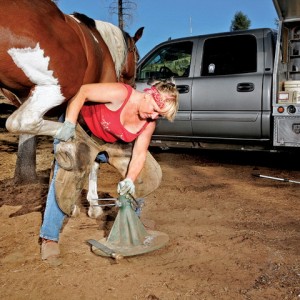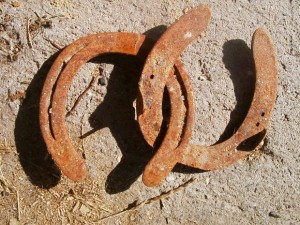What Do I Do If My Farrier is No Good – How to End it With Your Farrier
If you think your farrier is no good, isn’t giving you a fair deal or if you think his/her skills are not up to standards then you will have to give him/her his/her freedom. Just like in any relationship it is important to tell them the truth and to let them know why you would like to end it.
Reasons to End it With Your Farrier

There are many reasons people want to change farriers. What would be your reason to search out a new farrier? Here are some reasons I can think of for ending it with your farrier.
Performing inadequately. This is the most important of all reasons. If you think the farrier is performing below par and not meeting your expectations then let them go. Although on the most part I let my farrier shoe according to his expertise I know if there were unusual trims, unbalanced hooves or errors I would have to find a new trimmer.
Being un professional. A professional should be on time and if s/he can’t be there, then as common curtesy they should call to say they will be late. I had one shoer who was late one day and I got worried and called his house. He had me on his schedule for the next day! Because he was so punctual I knew something was amiss. I also had one farrier say he would be there at 11 and showed up a 4pm! (he didn’t last too long)
As horse owners we understand horses misbehave and things may go awry in a blink of an eye but continual disregard for a person’s time is important and habitual lateness is grounds for a breakup.
How To End It
Let them know what is bothering you about their shoeing. Is it they:
- Don’t listen to your requests?
- They are habitually late?
- Not shoeing correctly according to what is presented to them.

If you are happy with their performance but not pleased with their tardiness, let them know and be explicit.
- “I like the job you are doing on Trixie’s feet, but you are so late I can’t plan my day. Can you please call to let me know you will be late?“
This might be all it takes for your farrier to call and say they will be late. If not it may be time to move on and find a different farrier. If they don’t shape up then maybe it is time to get a new shoer.
Give them a chance to shape up. If you are happy with them then give them a chance to ‘get it together’. It is important to let them know you are considering getting a different farrier.
Once you have decided to switch to a different farrier, don’t be wishy washy. Be clear and succinct.
“I have made my decision to change farriers because” <insert your reasons here>.”
What is the common reason you would want to change farriers? I was forced to change when my farrier got full time employement shoeing with the RCMP. Why would you change your farrier.
Laura
 Try these three powerful exercises to get strengthen your position.
Try these three powerful exercises to get strengthen your position.

I often hear the excuse there are no other farriers (or vets, or trainers, or . . . ) that serve a particular area and this becomes the reason for staying with a bad provider. It may require doing some digging, but I’ve found this simply isn’t true, even in most rural areas. One important skill trait rarely discussed with blacksmiths, particularly when working with young stock, is patience. I have no objection to a hoof trimmer making a needed correction but get frustrated if they lash out when a horse is confused or afraid. Owners should be considerate enough (for the horse and the vendor) to spend ample time working with the horse to prepare them for what will be requested during trimming/shoeing but there’s nothing natural about being asked to stand on three legs for an extended period of time. So I guess my answer to ‘why change your farrier’ would be inappropriate discipline. In fact I did let one go for this reason alone – he had grown scared of horses and would go after them every time they moved.
Thank you Nanette for your comment.
Inappropriate discipline is a good reason for not continuing on with a farrier. And I totally agree about horse owners preparing horses for the rigors of horse shoeing/trimming. This, I think, starts early on with proper hoof handling. I remember picking up foals hooves at an early age and brushing them and banging them with the hoof to get them used to future farrier work.
Thanks Nanette.
~Laura